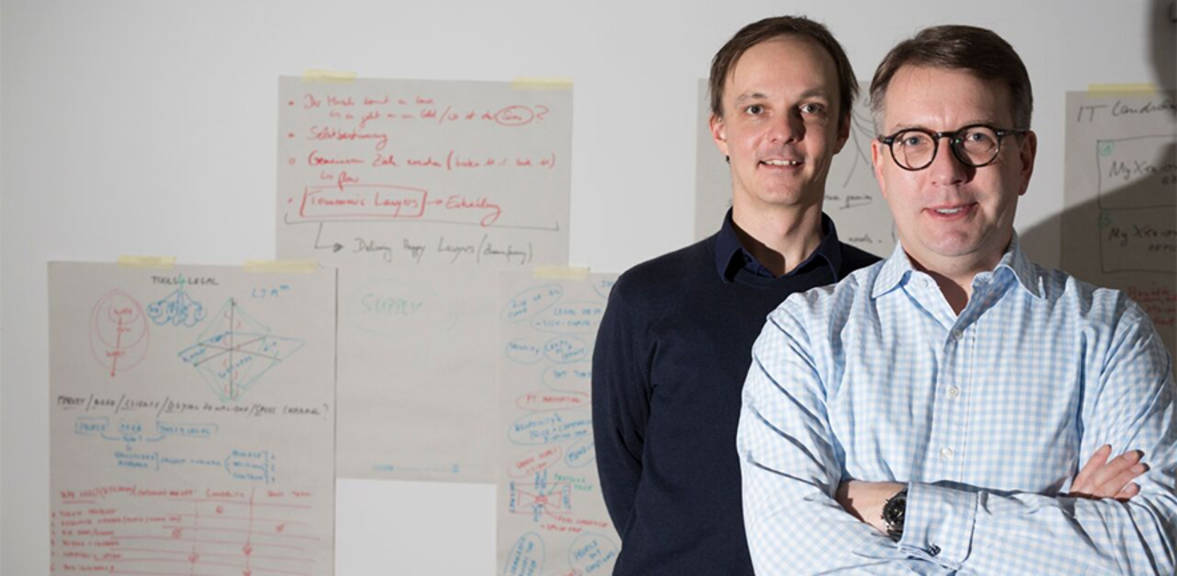Each participant on the Cambridge Executive MBA (EMBA) programme has a unique set of reasons for joining the programme. But for legal professionals Felix Rackwitz and Filip Corveleyn, the motivations were strikingly similar.
One driver for us to do the EMBA was a shared fascination with the old traditional way legal business and legal service deliveries were carried out, and with the whole business model of how law was brought to market.
Our decision to join a startup
After completing the programme, both Filip and Felix returned to traditional law firms, but were unable to effect the changes they believed necessary.
We took the ideas away from the EMBA, trying to implement them in our current business lives. But we soon found out that was not going to happen. It was clear that change couldn’t come from the existing players in the market. “In the two years that we participated in the EMBA, we collected a lot of ideas, research and data on what was happening in the legal market. One of the surprises we had was that we saw innovations happening in the UK and US, but nothing happening in the continental legal market. We started to wonder why that was, and both wrote our Individual Projects on the law-firm service delivery model.
A new business model
Xenion Legal offered the chance to develop their ideas, and in 2012 Felix and Filip joined the company as Chief Operating Officer and Head of Research and Development respectively. Founded in Germany by Dr Carsten Reimann, a former director of Nissan’s Brussels office, it provides businesses with access to a network of top attorneys and corporate counsel, controlled by a central management hub. Xenion provides “people solutions” for companies that need to enlist legal expertise on an ad-hoc or more permanent basis.
Their new paradigm for business is finding favour with major multinational clients. A deal with a global clothing manufacturer, led to a two-month trial of delivering legal services and process automation.
During the EMBA, I met Felix, who is the only other lawyer in our group. So there was a natural link for us to start a conversation. And throughout the EMBA, we both focused on innovation in professional services and, more specifically, in the legal industry. I think it was Felix who set me on the track of Richard Susskind and other authors who had written about innovation in the legal industry and the intrusiveness of technology and how that would change the job of lawyers today for tomorrow.
And so we ended up doing a team consulting project on the issue of how to set up a captive legal process, an outsourcing process, for a German law firm. And eventually, both our individual projects on innovation in the legal industry, whereby I think Felix had a lot more interesting study being done on the impact of innovation and technology on what lawyers do and how lawyers work, where I was much more looking at technology side of things, how does technology change the way in which you work and how clients experience the legal industry or legal products as such.
And I think then, when we finished our EMBA in 2012, we both went back to our respective jobs. Felix took up a job as global head of business development. I went to my job as a corporate employment lawyer with the clear intention to take the knowledge we’ve learned and the lessons learned from Cambridge into our respective organisations, trying to change the system from within because clearly, what we had experienced was that there was a problem, and it needed some change.
What we were not prepared for, I think, in all of our enthusiasm leaving the EMBA was the disappointment in the powers of the existing business models resisting change. Although we had lots of case studies on change and change management, and I deal with change management all the time, when you’re trying to change something yourself, you can feel that there’s lots of issues you hit along the way.
There’s an inherent contradiction between the usual business model of a law firm and the market demand today. You are asking a law firm to be more efficient in delivering their services. But because efficiency means doing things in less time, that means fewer billable hours. So what the market is asking law firms to do is something they can’t deliver upon, because of their business model.
Tools4Legal
At the end of 2014, Felix and Filip decided to found their own company, Tools4Legal, now TPR Legal, taking with them the multinational client contracts they had won while working for Xenion. After a successful test project in 2014, the company was awarded a full outsourcing deal for three years, encompassing operations in 19 countries in 2015, further securing another two multinational clients for the disruptive legal solution.
To add to their management team they recruited Munich-based lawyer Andreas Panzer, a specialist in regulatory and tax matters who will act as Legal Counsel. Additionally they are about to appoint an operation director and contract management specialist.
We are very excited about the future, client happiness is very important to us, we don’t just want to be efficient – we want to make sure that the experience of the client in going through the work is actually improving.





